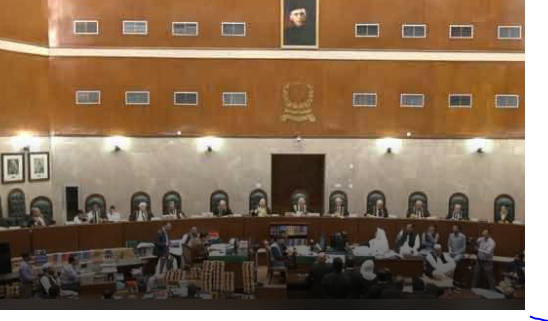Canada Global(Web News) The Supreme Court reserved its decision on the petitions against the Practice and Procedure Act. The decision of the Supreme Court Practice and Procedure Act case was pronounced at half past five. The full court of the Supreme Court completed the arguments of Attorney General Usman Mansoor. After that, judgment was reserved on the application against the Practice and Procedure Act.
The petitioners have seen this as an attempt by the government to curtail the powers of the Chief Justice.
In April, the Supreme Court, headed by then former Chief Justice Umar Atta Bandial, restrained the government from implementing the law until the petitions challenging it were decided. This decision was delivered by an eight-member bench comprising of former Chief Justice Bandial, Justice Ejazul Hassan, Justice Muneeb Akhtar, Justice Syed Mazahar Ali Akbar Naqvi, Justice Muhammad Ali Mazhar, Justice Ayesha A. Malik, Justice Syed Hasan Azhar Rizvi and Justice Shahid Khaqan Abbasi.
Five hearings have been held in the full court of this case so far. At the last hearing, bitter exchanges between judges and lawyers indicated unease among judges about the court’s work.
During today’s proceedings, Chief Justice Isa emphasized that institutions, particularly the Supreme Court and Parliament, should respect each other and “not stand against each other”. He also said that Institutions are not perfect, they must evolve.
At the beginning of the hearing today, Attorney General Mansoor Usman Awan presented his arguments. He said that his arguments will be based on the government’s written response submitted to the court.
The Chief Justice said here that “you are saying that you will not repeat the arguments but highlight them” to which Awan said that he will talk about the independence of the judiciary and Article 191 of the Constitution.
, Justice Akhtar recalled that prior to 1973, changes in Supreme Court rules were subject to the permission of the Governor General or the President.
The Attorney General said that there is no restriction on Parliament to amend laws under Article 191
“Are you saying that there is no restriction on Parliament amending laws made by the Supreme Court?” Justice Ahsan asked, “So is there no restriction on the Supreme Court amending a law made by Parliament?”
Awan replied that Parliament is a law-making body. He further said that if the number of pending cases in the Supreme Court exceeds 70 thousand, there may be a need to make another law.
Meanwhile, Justice Naqvi asked if the AGP had brought the record of the number of parliamentarians who had debated the Practice and Procedure Act. “It’s on the website,” Awan replied.
At one point, Chief Justice Isa said that institutions should not be pitted against each other and should have mutual respect.
“I think Parliament respects the Supreme Court. Parliament could have taken another step if it wanted, which it did not. I am sure that this step was not taken because the Parliament trusts us, the Chief Justice added, not to widen the scope of the matter. Parliament is not our enemy and does not consider us as enemy. Both can be run simultaneously


